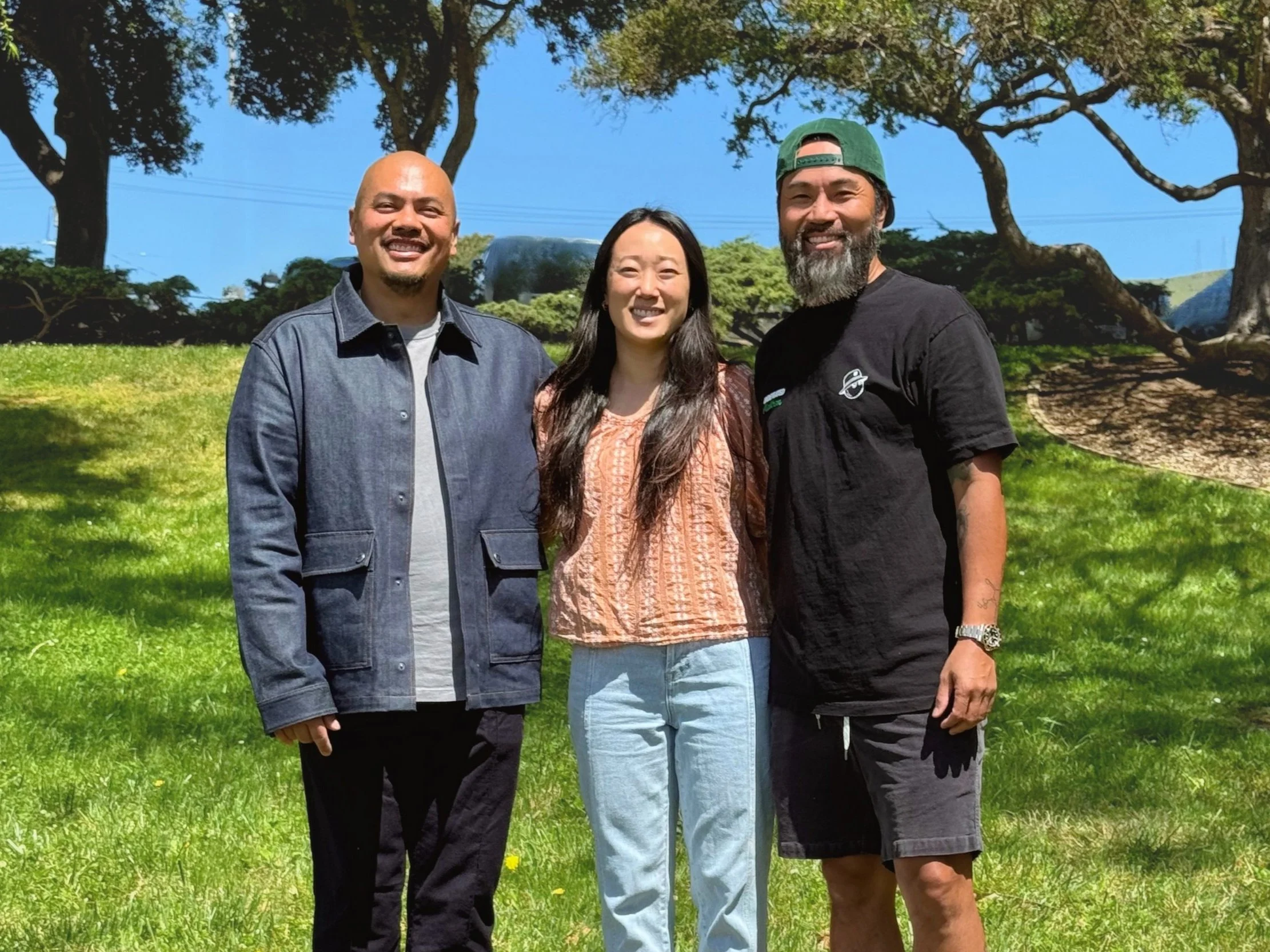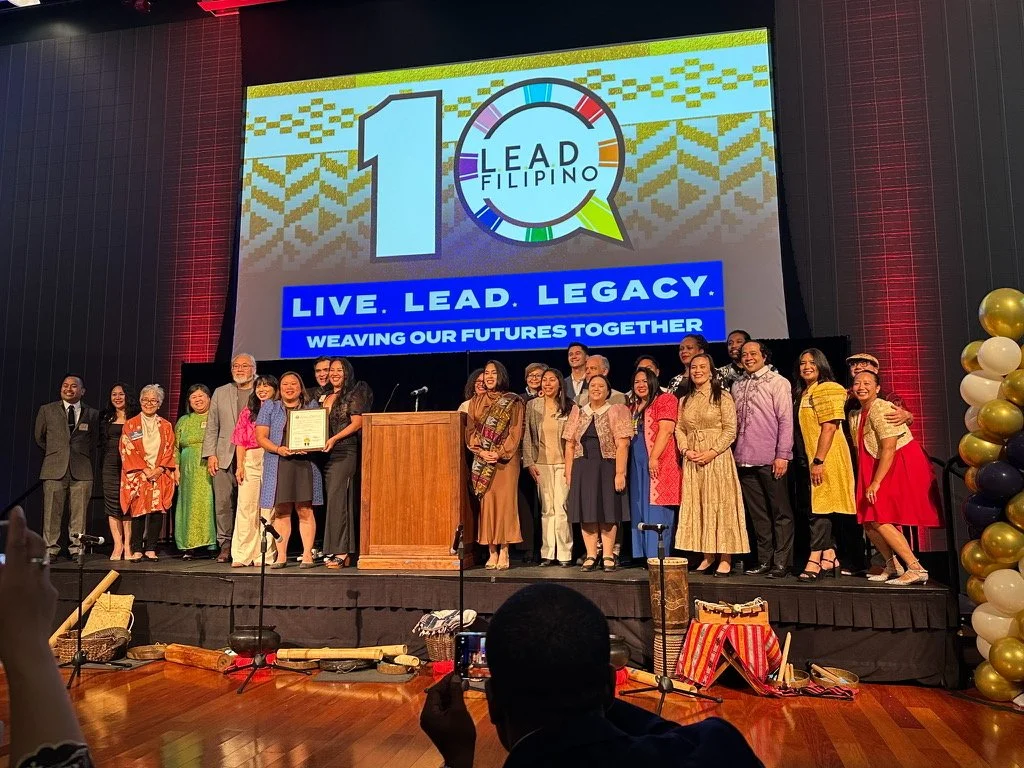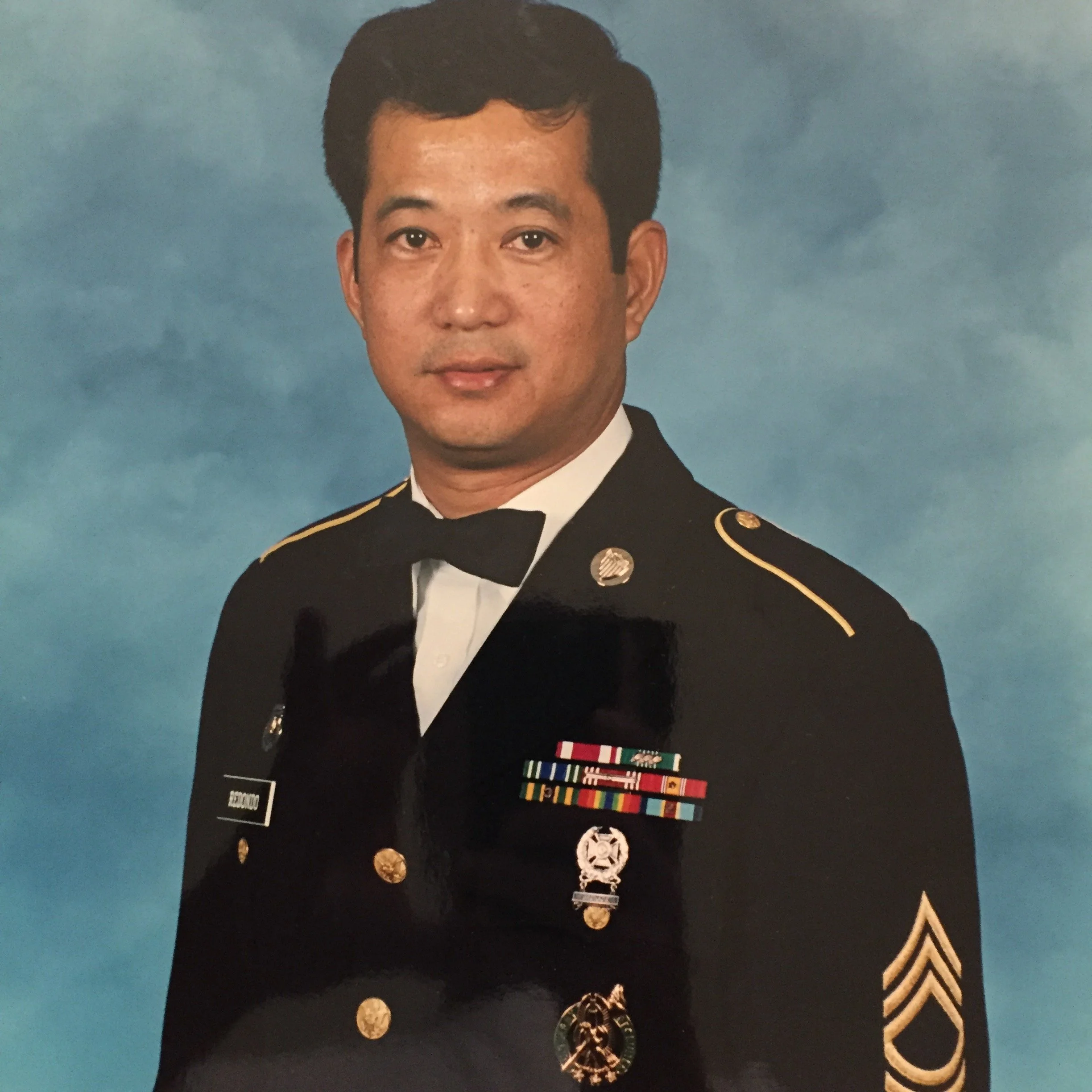How FilAm Co-Founder of Crispbay Lael Abaya’s Beef Chips Are Spicing Up Snacks with Filipino, Vietnamese, and Korean Flavors
The Bay Area is spoiled with a diverse offering of cuisines from around the world. As more and more immigrant families expand to the second generation and beyond, it’s inevitable that new renditions evolve and that’s how fusion food is invented. That’s exactly what happened to three friends united by a shared love for food and rich Asian-American cultural heritage. Together, they created CRISPBAY Snacks, which is their take on traditional beef jerky - a “beef chip” infused with flavors stemming from their family’s recipes and roots.
We had the opportunity to chop it up with Filipino-American, Lael Abaya, one of three founders of CRISPBAY, an Asian-American snack company.




1. Tell us about yourself, Lael.
Lael Abaya: I grew up in San Diego in an immigrant family. My dad was in the military, and my mom was a nurse, who made their way to America in the 1980s. As with any immigrant parents, they worked really hard to try to provide a good life for us, and I'm forever in their debt. We had a house, food on the table, and with whatever extra money my parents had, they would try to provide us with whatever extras they could. They set me up for success, which led to getting into a good school (as you know, because I went to school with you), and graduating from UC Berkeley for undergrad.
Jennifer Redondo: Go Bears!
Lael Abaya: Now in my adult life, I wear a bunch of different hats. The most important role I have now is that of father to two young boys. I’m trying my best to raise them to be respectful, generous, and kind young men. I am a husband to a truly wonderful partner, who also happens to be an attorney! As much as people might think we get into these epic fights, we don't because we understand each other. She is my biggest supporter and has been instrumental in helping me grow both personally and professionally.
I am an attorney practicing workers’ compensation law. There are a lot of attorneys in California, but the subset of Filipino-American attorneys is relatively small. Even though I enjoy poking fun at the profession, I'm very proud to be able to practice law because it took a lot of hard work to get here. I’m also fortunate that through my practice, I get to help people through very difficult parts of their lives.
The newest hat I get to wear is as a co-founder creating snack foods! I knew nothing about the snack food space before launching CRISPBAY. But I think that’s what makes it a fun project - it’s a break from the norm of what I'm used to as a dad, husband, and attorney. CRISPBAY is a creative outlet for me, and I’m proud to see this project come to fruition.
2. How did you come up with CRISPBAY Snacks?
Lael Abaya: I think the best ideas come when you don't expect them. CRISPBAY’s origin story started at Dead Eye Coffee in South San Francisco. My law office is close by, and Dead Eye was my daily watering hole. Over time, I came to know the team and Brian, the owner, really well. One day, Brian, who had just come back from Hawaii, offered me a snack, a crispy beef jerky. It was my first time trying crispy beef jerky and after taking a bite, I was addicted. The flavor and texture were different than anything I’ve tried before.
Christy, a barista working that day, was also there, and she also raved about the addictive quality of the crispy beef jerky. The three of us agreed that this was a really good snack. Over the next two weeks, Brian, Christy, and I kept on snacking and raving about the crispy beef jerky. At some point, Brian asked Christy and me, “Are you down to put our twist on crispy beef jerky?”
At first, we thought he was joking. But he wasn’t. In a serious tone, he asked, “Are you guys down?” So with that, we decided we would give it a go, and the seed was firmly planted.
We started doing research since we wanted to know if there would be a market for this product, especially if we were going to devote time, energy, and resources outside of our full-time jobs. We all already had busy schedules, so we wanted it to make sense. Brian, Christy, and I actually already had our own businesses, but none of us had any experience developing food products.
We found companies selling crunchy beef jerky products, but typically with flavors such as “original” and “spicy”. We thought it would be cool if we put our own spin on it, by leaning into Asian flavors that reminded us of what we ate growing up. We all have different ethnic backgrounds, so we each decided to develop flavors that spoke to our ethnic heritage - Vietnamese, Korean, and Filipino. Fortunately for us, living in the Bay Area, we also concluded that we had a market demographic that would understand the flavors we were trying to develop.
It took us almost a year to launch our products. We were methodical, given our busy schedules and the time demands of starting a business from the ground up. We also knew that we needed to be thoughtful about how we represented each of our products to honor both our families and our cultures.
Speaking for the Filipino BBQ specifically, I knew that it would be very difficult to develop a flavor that would encompass people’s preferences. Filipinos are very passionate about their food - everything from how saucy you like your adobo (I like dry adobo) to how sour you like your sinigang (medium sourness level for me).
Jennifer Redondo: I like my sinigang very sour!
Lael Abaya: Exactly! It took a while to settle into a flavor that made sense for our beef chips. Ultimately we wanted flavors that reminded us of our childhood. For Christy, that was kalbi. For Brian, it was a bowl of pho. For me, I thought about Filipino parties on the weekends that my parents would make my brother and I go to. If that party had Filipino BBQ, it would be extra special.
My main goal in developing the Filipino BBQ flavor was to make sure the essential ingredients in Filipino BBQ were present. For me, that’s the sweetness from the banana ketchup, tanginess from the vinegar (as if you dipped the BBQ into a sawsawan), and a hint of spiciness from sili.
After multiple rounds of trying to nail the right flavor profile and balance, I had two of the toughest critics taste the beef chip to give feedback - my wife and my mother-in-law. Their family helped open two very popular Filipino restaurants in the Bay Area (Ong Pin and Karilagan), and they would have no qualms about telling me what they thought. When they both gave their stamp of approval, it was quite an honor, especially from my mother-in-law, who isn’t exactly someone who gives compliments freely. That motivated me to keep trying to nail down the best possible version of the Filipino BBQ beef chip.
Even though Brian, Christy and I each had our businesses, we quickly realized food production is very different and we had a lot to learn. Luckily, we have skill sets and are in industries that complement each other. Christy has a consulting business that helps businesses grow, specifically leveraging their e-commerce marketplaces. Brian owns a popular coffee shop and understands a lot about operations and logistics. I bring an understanding of regulatory and compliance issues with my legal background. I view the three of us as a triple threat, in terms of being able to tackle a bunch of different things to get a business up and running.
3. What makes CRISPBAY Snacks different?
Jennifer Redondo: How would you explain what a “beef chip” is? Is it beef jerky? In the grocery, what aisle would we find you?
Lael Abaya: CRISPBAY Snacks is a beef chip but with a twist. So even though most people may look at our product and think “beef jerky”, we wanted to highlight two features in our product that make it a “beef chip”. First, we try to achieve a “crunch” element that is different from what people typically think of when they think of a beef jerky product. Second, we want to introduce flavors that haven’t been explored in typical beef jerky products, and we thought it would be a great idea to showcase flavors from our childhood that reflected our upbringing.
We also wanted to make those two features very apparent in our packaging. We were fortunate enough to work with a designer who is Filipina-American, and understood what we were trying to capture. Once you look at our bags, you’ll notice little details in the design that highlight both the texture and the ethnic backgrounds represented in our products.
What also makes CRISPBAY different is that we are not working with random food scientists in some lab trying to create a snack that focus groups will like. We grew up with these flavors, and we believe these flavors will resonate with a lot of other people who grew up just like us. To take it a step further, we wanted to showcase these flavors through a vehicle that the general public can understand. And who knows? Maybe our beef chips can help more people explore our respective cuisines with a newfound curiosity.
4. What was the biggest obstacle you faced along the way while creating CRISPBAY Snacks?
Lael Abaya: I wouldn't say creating our actual beef chip products were difficult. However, bringing that beef chip to market, especially for the three of us who had no experience with this type of product, required a lot more considerations than just sticking meat into a dehydrator, packing it up, and shipping it out.
We learned very quickly that if you want to do things right the first time, you have to pay attention to the not-so-fun things in starting a snack business. This ranges from making sure you set up the right accounts to be able to sell products online, to making sure you have the right mix of insurance.
You have to pay attention to all of the mundane details because if you don’t, it might prevent you from bringing something to market. Or even worse, if you don’t do it, you could be facing a massive problem later that can ultimately cost you the business itself.
5. What advice would you give to someone interested in going after ideas that come to mind or that come up in discussions with friends?
Lael Abaya: Before starting my own firm and launching CRISPBAY Snacks, I would describe myself as risk-averse by nature. But here's the best advice I can give - my children play baseball. At most, they each get five pitches before they’re out (unless they strike out before five pitches). Both my sons are still learning how to bat, and at first, they were always waiting for the perfect pitch to swing. Sure enough, five balls would pass by, and not a single swing. I had to tell them, “If you don't swing, you don't know if you're going to hit the ball, so at some point you’re going to have to try.”
You can spend a lifetime trying to create a perfect business plan or a perfect product. But that doesn’t mean anything unless you actually “swing” and try to put yourself out there. Even if you swing and you miss, at least you tried, and you can walk away knowing you gave it a shot.
6. Where do you sell CRISPBAY Snacks? What is your long-term goal and vision?
Lael Abaya: For now, you can find CRISPBAY Snacks online on our website: www.crispbaysnacks.com. We just launched this April, and we're ramping up to make our product more readily available to order once people learn about our beef chip. Eventually, we are looking to sell at farmers' markets and hope to be stocked at retail locations (both big and smaller mom and pops).
Right now, we are a true start-up - Brian, Christy, and I are doing everything from buying meat and ingredients to shipping out the finished product to customers, and everything in between. Long term, we would love to introduce more flavors of beef chips, as well as develop other Asian-inspired snack products. If we can manage to have our products stocked at national retailers such as Target, Whole Foods, or Costco, that would be amazing. Until then, we’ll keep our heads down and keep working hard.
7. What is one of the biggest lessons you've learned?
Lael Abaya: As I mentioned earlier, you have to acknowledge your weaknesses, but don’t let that cripple you. Rather, that self-awareness should give you the license to ask for help. You don't have to figure everything out by yourself. There are a lot of people that are willing to help you if you ask. Throughout the past year, we’ve been blessed with many people who have generously donated their expertise, time, and support. All it took was a text, phone call, or email. The reason why CRISPBAY was able to launch as quickly as it did was that all three of us were not too proud to ask for help.
8. What does it mean to be Filipino American to you?
Lael Abaya: I think about that question through the lens of raising my sons. It makes me sad in some ways that their connection to being Filipino will be vastly different than mine. They don't know how to speak or understand Tagalog. They’ve never been to the Philippines. Certain cultural rites of passage will be foreign to them.
But rather than be sad about it, I think it’s important to understand that it is an evolution. My responsibility in that evolution is to identify parts of my experience as a Filipino-American that may resonate with my sons, and shine a light on it. Whether that is through certain traditions, food, or even words and phrases, every connection will be better than if I tried nothing at all. And with every connection that is made to the “Filipino” side of Filipino-American, I hope that it may provide a glimmer of curiosity that will lead to an exploration of our ethnic and cultural heritage.
9. What else do you want to share with our readers?
Lael Abaya: Our goal is to showcase flavors that we grew up with, and to put out products that we are proud of. It brought each of us so much joy to have each of our parents try our beef chips, and give their stamps of approval. We’re really looking forward to sharing our CRISPBAY Beef Chips for everyone to try and enjoy, and for you to get a glimpse of flavors that bring each of us so many memories.
10. Where can people find you?
On our website: https://www.crispbaysnacks.com/. We are also on Instagram and TikTok @crispbaysnacks.
Written by Jennifer Redondo
Co-Founder and Co-Author of In Her Purpose

























When the Avengers: Doomsday one-year countdown dropped, audiences didn’t just watch. They paused, replayed, shared, and even speculated about hidden messages. A week later, the clip surpassed 14 million views, becoming a viral moment picked up across major media outlets that fueled anticipation for the next chapter of the Marvel Universe.
The countdown video was the result of a collaborative effort led by AGBO and its studio partners. Supporting the marketing team as a contracted editor was Joshua Ortiz (@joshuajortiz), a Filipino American filmmaker whose career has steadily built toward opportunities to contribute to projects of this scale, alongside earlier success with the short films he has written and directed.